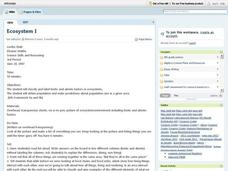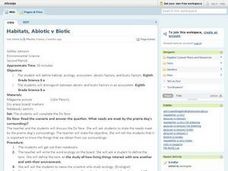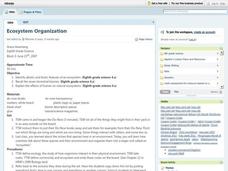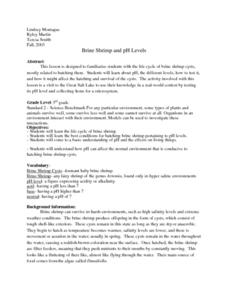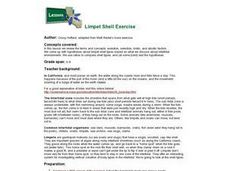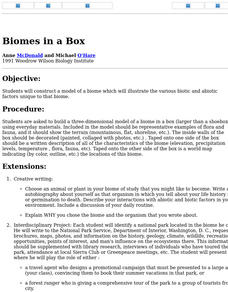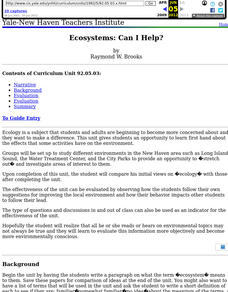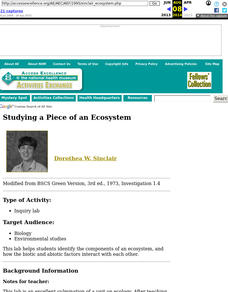Curated OER
Abiotic and Biotic Factors
Learners examine abiotic and biotic factors. They define biotic and abiotic, categorize a list of items onto a Venn diagram, label various items from areas on the school grounds as biotic or abiotic, and diagram a magazine picture.
Curated OER
To Be or Not to Be - Abiotic/Biotic Factors
Students define and compare/contrast abiotic and biotic factors presented while using web cameras on the Web World Wonders website.
Curated OER
Forest Management ~ Diseases and Pests that Effect a Good Harvest Stand
The forestry presentation found here lists and describes a variety of tree diseases. A few unappetizing photos are included to show symptoms of some of these diseases, or the insects and fungi that cause them. If you have a class that is...
Curated OER
Life in the Soil - Is the Soil Alive?
Amaze soil scientists with a list of the myriad of microorganisms residing in a mere 1/4 teaspoon of soil! Then take them on a ride through the carbon cycle, down to the level of decomposers. Finally, give more specific details about the...
Curated OER
Hands on Biome--Building
Students create a model biome. In this ecology activity, students use materials to create a model biome. There is an extension activity that allows students to write about plants and animals and their specific biome.
Curated OER
Vocabulary: Kansas Prairies
Students explore the ecosystem by reviewing scientific vocabulary terms. In this environmental awareness activity, students identify the differences between abiotic and biotic factors and their relationship to the Earth. Students define...
Curated OER
A Walk in the Woods
Eighth graders observe and identify the different levels of the forest. In this forest zones lesson students observe, identify and name a variety of forest components and describe how humans impact the forest ecosystem.
Curated OER
Critters in Your Own Backyard
Pupils identify various animals and their habitats, as well as their specific traits In this animal habitat lesson, students list animals they've seen in their backyard. Pupils select one animal and do research. Students then answer 9...
Curated OER
The Principles of Ecology
In this ecology worksheet, students complete a word search by finding 21 terms associated with habitat, ecology, biosphere, and niche.
Curated OER
Organisms and Their Environment
In this organisms and their environment worksheet, students will review concepts relating to ecological studies, levels of organization in ecology, and relationships between organisms in ecosystems. This worksheet has 10 fill in the...
Curated OER
Final Review Word Search
In this biology instructional activity, students identify and locate various vocabulary terms related to reviewing biology. There are 47 words located in the puzzle.
Curated OER
Ecosystem I
Learners classify and label biotic and a-biotic factors in ecosystems. They define population and make predictions about population size in a given area. They describe the a-biotic factors' importance and impact on the other elements...
Curated OER
Habitats, Abiotic v. Biotic
Students explore and define ecosystem, ecology and habitat. They discuss abiotic and biotic organisms and the things needed for survival. After observing pictures of animals in their habitat, students compare and contrast habitats and...
Curated OER
Ecosystem Organization
Eighth graders engage in a lesson about ecosystems with the intention of looking at how it is organized. They cover the biotic and abiotic factors of an ecosystem while looking at the seven types of terrestrial biomes. Students write...
Curated OER
Brine Shrimp And Ph Levels
Third graders investigate the different ph levels found in water that is tested using simple measurements. The water samples are taken from a local body of water. The ph levels are used to help indicate areas where shrimp can thrive in...
Curated OER
What Is In The Water?
Students investigate the biotic and abiotic factors that are found in an aquatic ecosystem. The emphasis is upon the investigation of present an projections of future water quality. Then students visit a local body of water to gather...
Curated OER
Ecosystems: Biotic and Abiotic Factors
Seventh graders examine proper journaling techniques, and record observations about at tree after listening to a read aloud of "Four Worlds: The Dine Story of Creation." They study the difference between living and non-living things, and...
Curated OER
Biotic vs. Abiotic Factors
Learners share their prior knowledge of the elements of the environment. In groups, they are introduced to the concepts of biotic and abiotic factors in a specific environment. They discover their effects on organisms living in the...
Curated OER
Limpet Shell Exercise
Learners review the terms and concepts: evolution, selection, biotic, and abiotic factors. They come up with hypotheses about limpet shell types based on what we discuss about intertidal environments. Students use ratios to compare...
Curated OER
Biomes in a Box
Students construct a three-dimensional model of a biome which illustrates the various biotic and abiotic factors unique to that biome. They use everday materials to represent the important characteristics of a particular biome and then...
Curated OER
Fascinating Factors
Learners observe biotic and abiotic things participating in an observational walk outside the school. They create a collage using pictures of biotic and abiotic items.
Curated OER
Ecosystems: Can I Help?
Students study how some activities effect the environment and ecosystems.
Curated OER
Studying a Piece of an Ecosystem
Students carry out an outdoor land study in which they identify organisms living in the soil, and any other animals living within the site. Groups also examine abiotic factors. They respond to a series of questions concerning their data...
Curated OER
Principles of Ecology
In this ecology worksheet, students will fill in a graphic organizer showing the relationship organisms have with their environments and with each other. This includes biotic and abiotic factors, tropic levels, and ecological pyramids....













